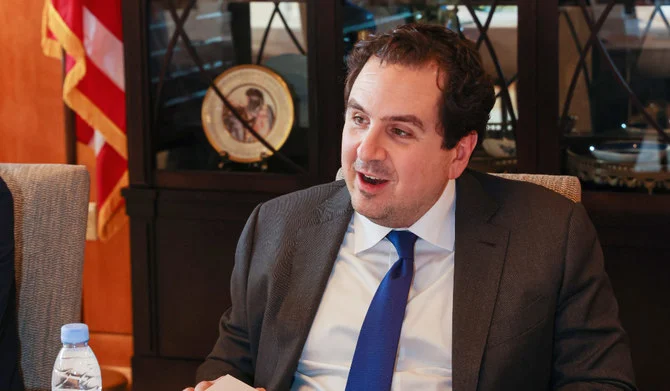
- ARAB NEWS
- 06 Jul 2025

Lama Alhamawi
RIYADH: America’s Deputy Assistant Secretary of State for Arabian Peninsula Affairs Daniel Benaim expressed concern over the impact of Iran’s supply of weapons to Russia and reaffirmed America’s commitment to advancing regional security at a press roundtable hosted in the US Embassy’s Quincy House in Riyadh on Thursday.
Benaim was part of a high-level US delegation that visited Riyadh from Feb. 13 to 16 and included Special Envoy for Iran Rob Malley; acting coordinator for counterterrorism and Acting US Special Envoy for the Global Coalition to Defeat ISIS Christopher Landberg; and Deputy Assistant Secretary of Defense for the Middle East Dana Stroul.
“Iran’s continuing supply of drones and other armaments to Russia for its aggression and brutal attacks on civilian targets in Ukraine will affect the security and safety of this region, and I think we should all be concerned by what Iran is getting in return for helping Russia’s brutal assault on civilians in Ukraine,” Benaim said.
Our efforts together include ambitious plans to deploy clean energy and develop technologies that will play a clear role in the energy transition of the world.
Daniel Benaim, Deputy assistant secretary of state for Arabian Peninsula affairs, US
“We can expect that to include different kinds of support to Iran’s defense industry and Iran’s capabilities to further destabilize this region, including through its proxies. It’s a very concerning prospect and something we all need to take very seriously,” he added.
The deputy assistant secretary said that he had come to Riyadh to have a series of conversations and make sure that “our partners in the region and, frankly, our own people in this region, who are also under threat from Iran and its proxies in multiple countries, have a strong and robust security cooperation.”
The delegation visited the Kingdom to participate in the US-Gulf Cooperation Council Working Group, highlighting shared priorities including Iran, counterterrorism, integrated air and missile defense, and maritime security.
Benaim explained that there were multiple senior US military officials delivering cutting-edge briefings on maritime awareness threats at sea as well as the latest thinking on how to best deter the threats of missiles and drones.
Discussing counterterrorism efforts against Iran, Benaim said: “There is a great deal of innovation happening by our adversaries and we need to be innovative and nimble as well in how we respond together, and that conversation was happening this week.
“We have certainly seen Iran provide a range of weapons and training and advanced equipment, such as drones and other support, to Houthi militants in Yemen,” he added.
“The unlawful transfer of lethal aid from Iran is irresponsible and dangerous and leads to violence and instability across the Middle East.”
Benaim also reaffirmed that the US is committed to working closely with Gulf states to help combat Iranian aggression.
“Alongside our partners, the United States will continue to deter and interdict this kind of lethal material entering the region, as was demonstrated by our recent actions, including the seizure of weapons and explosives and component parts on multiple occasions over the past few months,” he said.
Benaim explained that the challenges to regional and international security posed by Iran’s nuclear issues and Iran’s decision to walk away from negotiations were both discussed in depth.
“These two were really important and deep consultations that (resulted in) a clear picture of the path forward,” he said.
“The Iranians lost the opportunity for a swift return to the full implantation of the Joint Comprehensive Plan of Action in September when they turned their backs on a deal that was on the table and approved by all,” Benaim added. “JCPOA has not been on our agenda for months now. What remains very much alive is President (Joe) Biden’s absolute commitment to never allowing Iran to acquire a nuclear weapon, as was reiterated and made clear in this week’s meetings.”
Benaim stressed that it is vital that the region is secure and that partnerships in defense and counterterrorism are strong.
“As we heard at the GCC, as well from member states, we believe — and our partners believe — that diplomacy is the best way to achieve that goal; diplomacy backed by strong security cooperation and partnership. But President Biden has been very clear that we have not removed any option from the table and that a military option remains as a last resort,” he said.
Benaim also spoke about future strategic partnerships between the Kingdom and the US in areas other than defense.
“This is an 80-year strategic relationship built up over generations with lots to discuss and lots to do,” Benaim said. “Our efforts together include ambitious plans to deploy clean energy and develop technologies that will play a clear role in the energy transition of the world.”
He added that building greater collaboration between energy experts in the two countries can enhance efforts to combat the climate crisis and contribute to the deployment of cleaner energy resources, not just in the US and Saudi Arabia, but around the world.
“There are lots of exciting projects underway between our two countries in fields like green hydrogen and electric vehicles, not to mention tourism, entertainment, and a whole range of other issues, where the Kingdom is changing and the US is eager to be a partner through our businesses … and bring about some of those economic transformations.”